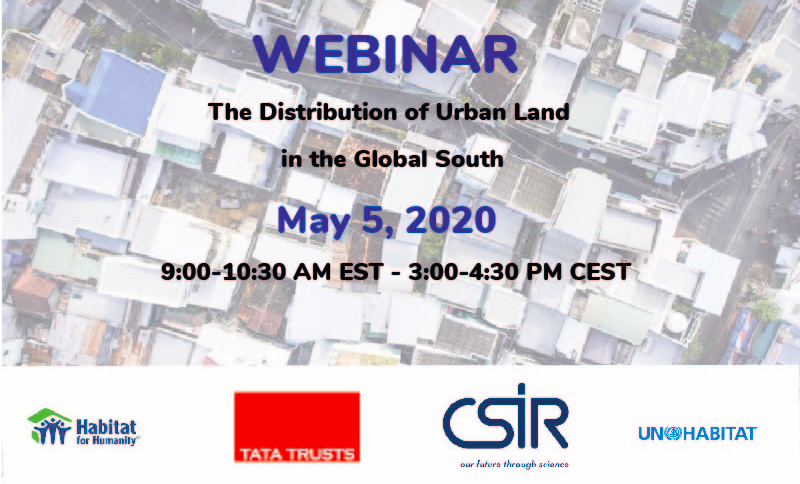Join us for a webinar co-hosted by the the Land Portal Foundation, Habitat for Humanity International, the Council for Scientific and Industrial Research, UN Habitat and Tata Trusts on the distribution of urban land in the global south.
Lack of access to secure use of land and rental land is perhaps one cause for the expansion or ongoing formation of so-called slums in urban areas in the global south, which are often located in risky areas and on vulnerable land, such as on areas of hills or on the edge of contaminated canals. These spaces have been allocated (often without approval) to populations who live in conditions of poverty and who, for various reasons, have been migrating from the countryside to the city. Mike Davis, in his book Planet of Slums, reports that until 1954 Kenyans were considered temporary occupants of Nairobi, where they could not rent or buy any property. In Zimbabwe, the original settlers had to wait until the independence of the country to obtain the legal right to buy a house in the city.
Recent aerial photographs of Nairobi, for example, have revealed that more than half of the population lives in just 18% of the urban territory. In Dhaka, it is estimated that 70% of the population is concentrated in just 20% of the city. In Santo Domingo, two thirds of the population living in slums and “invaded land” use a fifth of the urban space. Among the most extreme cases recorded by Davis is that of the city of Mumbai: "While the rich have 90% of the land and live comfortably and with many free areas, the poor live squeezed into 10% of the land."
The geographical characteristics of these territories, highly populated and without the assistance of basic services to lead a dignified and safe life in the city, causes various problems such as that which has been lived in the city of São Paulo on February 9, 2020. Many homes and lives were lost due to landslides caused by heavy rains in slums that were located on hills. The formal city population argues that these populations choose these types of territories to settle, placing themselves at risk. This places the responsibility for the unequal distribution of urban land on the poorest populations, without reflecting on the origin of this distribution and experiences, in terms of access to urban land, of these populations.
For this reason we have proposed a dialogue to reflect on these inequalities between panelists, in order to share their experiences on the subject due to their active participation in issues related to the inequalities that are lived in cities of the southern hemisphere and the colonized world.
Moderator:
- Jane Katz, Habitat for Humanity International
Speakers:
-
Mark Napier, Council for Scientific and Industrial Research South Africa
-
Raquel Ludermir Bernardino, London School of Economics
-
Tala Kammourieh, UN Habitat
-
Shikha Srivastava, Tata Trusts

